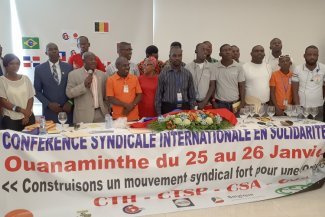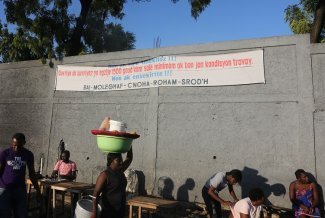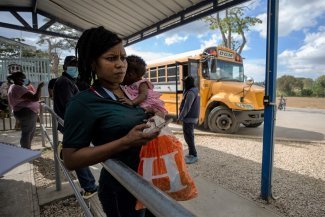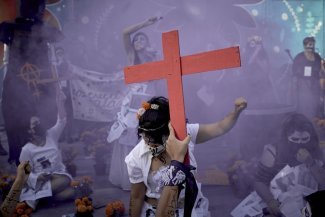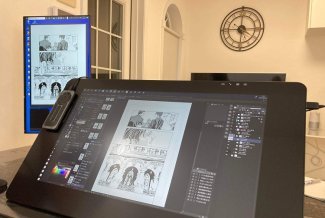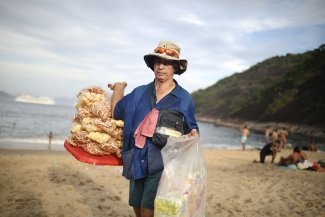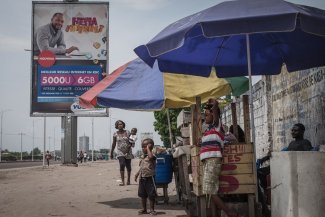What analysis do Haitian trade unions make of the current crisis and the Presidential Council? How do they see the role of international actors? We speak to Jean Bonald G. Fatal (left), president of the Confederation of Workers in the Public and Private Sectors (CTSP), and Jacques Belzin (right), president of the Confederation of Haitian Workers (CTH), to get their perspective.
Since 29 February 2024, Haiti has been in the grip of a new wave of armed gang violence. Prime Minister Ariel Henry, who was travelling abroad at the time, found himself unable to return to the country. Washington, which had previously been alone in backing him, proceeded to withdraw its support and Henry announced his resignation on 11 March.
Under the aegis of the Caribbean Community (CARICOM), a nine-member Presidential Council (seven voting members and two observers) has been set up. The Council, whose members represent political parties, the private sector and civil society, will appoint an interim Prime Minister and organise a transitional phase with a view to holding elections. The international community, and the United States in particular, are now calling for an urgent transition, even after stubbornly rejecting the transition plan set out in the Montana Accord. Signed on 30 August, 2021, this agreement was developed by a wide coalition of civil society, including the trade unions.
How do Haitian trade unions view the current crisis, the Presidential Council and the actions of the international community? What is their view of the multinational security force requested by Ariel Henry, authorised by the UN in October 2023 and due to be deployed under Kenyan authority?
Jacques Belzin, President of the Confédération des Travailleurs Haïtiens (CTH) and Jean Bonald G. Fatal, President of the Confédération des Travailleurs et Travailleuses des Secteurs Public et Privé (CTSP) spoke with Equal Times.
How have you been able to work under the current circumstances?
Jean Bald G. Fatal: Personally, I’m unable to work. I work as a civil servant but many government buildings have been occupied or burnt down by gangs. Some have been closed for fear of fire and looting, while others have been occupied by people forced to flee their homes due to the violence. Practically everyone is holed up in their homes. Face-to-face meetings are currently impossible in Port-au-Prince, so we are holding virtual meetings.
Jacques Belzin: We’re stuck at home but as the head of trade union organisations, we have to work, to assume our responsibilities and put forward the workers’ demands. While the problem of insecurity is particularly acute in Port-au-Prince, over 90 per cent of which has been occupied by armed gangs, the country’s other departments are still functioning. People there are working and we have to support them.
What are your thoughts on the current situation and on the Presidential Council, which CARICOM has helped put into place and which will be responsible for ensuring the transition?
J.B.G.F.: The crisis we are in was created and fuelled by the international community, which continues to make the same mistakes. The people that Caricom has invited to help solve the crisis are the same people who caused it. They include the employers who signed the 21 December 2022 agreement with former Prime Minister Ariel Henry. Employers are represented even though the formal sector only accounts for between 8 and 12 per cent of the economy. The trade unions, on the other hand, which represent workers in both the formal and informal economy, were not invited to the negotiating table!
In addition to the trade unions, women have also been excluded from the process. The one woman currently on the nine-person board was appointed at the last minute, following the withdrawal of a man, and is only an observer with no voting rights. All seven decision-makers will be men.
J.B.: Haiti is now in the hands of Caricom, whom we’ve written asking that trade union representatives be included at the negotiating table. You could say that the trade union sector is being represented indirectly through Fritz Jean, who was designated as the representative of the Montana Accord, which we are also a part of, but the CTH and the CTSP have asked to participate directly in the negotiations.
The Montana Accord has also been distorted in part. Traditional political parties have joined and then withdrawn from it. Others have joined forces with Ariel Henri to weaken the agreement. The politicians are only thinking about their own political interests while warping the objective of this agreement, which is to initiate a transition that breaks from the past. Organised civil society must succeed in creating a critical mass that can act as a lever to establish a transitional government. This is not yet the case.
You don’t have high hopes for the Presidential Council?
J.B.G.F. : It’s much ado about nothing. Haiti has experimented with this form of governance on several occasions to no avail.
J.B.: In 1986, after the departure of Duvalier, we had a presidential council of sorts. It didn’t produce any results. I don’t want to be a bird of ill omen but there is little chance that this Presidential Council will fulfil the mission for which it was created. Is anything going to change?
What about the prospect of a multinational armed mission?
J.B.G.F.: It’s a bad joke. Apart from the problem of legitimacy of an international intervention, this force has no capacity whatsoever to resolve the crisis. If we really wanted to help Haiti, we would support the Haitian armed forces and police and give them equipment and weapons. The problem is not the police as such but the governance behind it, the politicians who make the decisions and set the broad outlines of policing strategy.
J.B.: We need a force to counteract the actions of these bandits – I would go so far as to call them ‘terrorists’ because the acts they commit are terrorist in nature. Without it there will be no peace. We have the national police force but the truth is that it has been gangsterised. We have to reform its structures in order to strengthen it. First we have to wait for the Presidential Council to be installed. But for the Council to be installed, the security situation has to improve. We’re in a vicious circle.
As trade union organisations, do you have any proposals for getting out of this crisis?
J.B.G.F.: Apart from the gangs, the problem is unemployment. Thousands of young people are joining armed gangs because they have no hope. Hope is dead. We want to eradicate the gangs but you can’t do that with weapons alone. We have to attack the problem at its roots. Weapons are a one-off problem. Solving insecurity in a concrete and definitive way requires solving the problem of unemployment and providing the young people of Haiti with jobs and other prospects.
J.B. : The economic issue is a priority. There can be no peace without a functioning economy. We live in a centralised country where everything is based in Port-au-Prince, where customs are vandalised, where we have lost more than 26,000 jobs in the textile sector and where the state can’t even pay its civil servants. We need to set up a multi-sector economic commission, and we need the government and donors to strengthen the national economy.
What role can international actors play?
J.B.G.F. : People talk about Ukraine and Gaza, but our situation is just as serious. We would like the International Trade Union Confederation (ITUC) to make more demands of the International Labour Organization (ILO), which was also created to prevent this type of crime against the population. We are counting on the unions to raise international awareness of what is happening in Haiti, because we live in a country where gangs kill, pillage and rape with complete impunity. We need a national and international wake-up call.
J.B. : The hypocrisy of the international community has to stop. It has helped to create this situation and we are now paying the consequences. As a Haitian, I’m not asking the international community to come and resolve the crisis for us, but it does have a major responsibility. Where do the gangs’ weapons come from?
Why does the United States give so much money to Israel to destroy Palestine and little to nothing to strengthen our police force, when we’re their neighbours, less than a two hours’ flight away? And Europe must not allow itself to be dragged down by the United States. The people of Europe have to understand that we need their solidarity.




